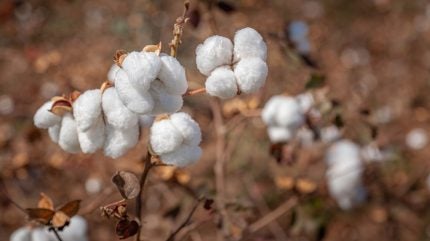
The forecasts show global cotton figures fell from an initial estimate of 25.9m tonnes (t) to 25.5m tonnes.
The US has experienced a substantial decline of 400,000 tonnes, attributed to water scarcity and atypical dry conditions.

Discover B2B Marketing That Performs
Combine business intelligence and editorial excellence to reach engaged professionals across 36 leading media platforms.
Pakistan’s production also fell by 100,000t due to similar climatic challenges, while Sudan reported a decrease of 50,000t as a result of pest-related crop damage.
Despite the shift seen among import and export partners, consumption and trade volumes remain relatively stable compared to the previous month.
China’s share of US cotton exports plummeted to 8% from 40% seen in the 2023/24 period. This change is due to the US’ increased cotton trade with nations such as Vietnam, Pakistan, Türkiye and India.
These market adjustments are occurring alongside policy changes such as a US executive order that exempts products made with US raw materials from import tariffs.

US Tariffs are shifting - will you react or anticipate?
Don’t let policy changes catch you off guard. Stay proactive with real-time data and expert analysis.
By GlobalDataThis policy incentivises transparency in product origins, aligning with the increasing demand for traceability among textile manufacturers, retailers, and brands, said ICAC.
Additional updates since the last report include a surge in India’s cotton lint imports for the 2024/25 season, nearly tripling from the previous year. Cotton imports from Bangladesh and India to the US are anticipated to grow.
The ICAC Secretariat is actively engaged in data rectification efforts to ensure accuracy across all reported regions and countries. This month’s revisions include updates for Ethiopia’s cotton market variables dating back to the 2014/15 season up to projections for the current season.
These adjustments incorporate information sourced from the Ethiopian Cotton Organization, Ethiopia Revenue and Customs Service, and Trade Data Monitor.
Looking ahead to price forecasts for the 2025/26 season, ICAC economist Lorena Ruiz has projected a range between 60 to 96 cents per pound, centring at an average of 76 cents per pound. These projections are based on prevailing supply and demand assessments.





